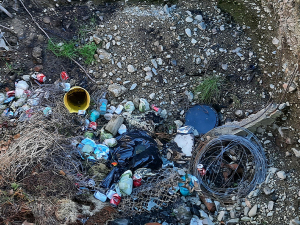Selwyn Farmers Lead as A Grades Climb to 77% in FEP Audits
Newly released data from Environment Canterbury (ECan) Farm Environment Plan (FEP) audits are showing a dramatic lift in environmental performance across the region.
 The pits are normally between one and four metres deep, with soil placed on top of the contaminated material to cover it. Photo Credit: Environment Canterbury
The pits are normally between one and four metres deep, with soil placed on top of the contaminated material to cover it. Photo Credit: Environment Canterbury
Owners of lifestyle blocks are being reminded of the rules around buried waste, as an increasing number of illegal rubbish pits are discovered.
Environment Canterbury compliance teams say it’s a growing problem across the region, with at least seven discovered in 2022 alone.
The pits are normally between one and four metres deep, with soil placed on top of the contaminated material to cover it.
James Tricker, Environment Canterbury regional leader of compliance, says there will be more cases that haven’t come to light.
“What we’re dealing with is probably just the tip of the iceberg. Some people will be doing it out of genuine ignorance, but others will know they’re breaking the law,” he says.
Offenders may face enforcement action, including written warnings, abatement notices, infringement notices or prosecution. There is also a recovery cost to cover staff time.
The landowner will also need to remove the waste, dispose of it correctly, and provide proof of doing so.
In some cases, soil testing may be carried out for evidence of contamination. If contamination is confirmed, it could be listed against the property on the Listed Land Use Register (LLUR).
On properties larger than 20ha, certain types of rubbish pits are permitted – with conditions. For example, a refuse disposal pit must be less than 50m2 in volume. It also needs to be designed in a way that prevents adverse effects on water and soil quality, to help protect groundwater that neighbours drink. The waste must be free of hazardous substances, agrichemicals and agrichemical containers – and been produced on the property. Pits can only be used if there is no kerbside or local authority refuse collection available.
Offal pits must also be smaller than 50m2 and are restricted to one pit per 100ha of property per year.
The 5+ A Day Charitable Trust has launched a collection of affordable recipes designed to turn everyday vegetables into seasonal stars.
Jane Mellsopp has been confirmed as the new Government Appointee to the New Zealand Meat Board (NZMB).
To celebrate the tenth anniversary of its annual Good Deeds competition, Rabobank will give away $100,000 to improve rural community hubs, schools, clubrooms, and marae across New Zealand.
Agricultural and veterinary product supplier Shoof International has appointed Michaela Dumper as its new chief executive.
Federated Farmers is celebrating following the Government's announcement that young farmers will be able to use their KiwiSaver funds to buy their first home or farm.
The Meat Industry Association of New Zealand (MIA) today announced that Chief Executive Officer Sirma Karapeeva has resigned from the role.

OPINION: A mate of yours truly reckons rural Manawatu families are the latest to suffer under what he calls the…
OPINION: If old Winston Peters thinks building trade relations with new nations, such as India, isn't a necessary investment in…